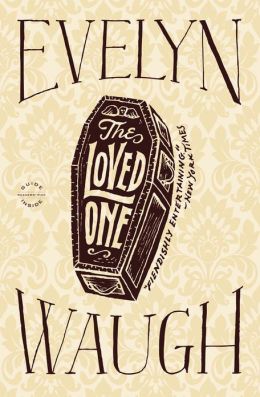Aimee Thanatogenos is caught between two men: One is Mr. Joyboy, her boss at the Whispering Glades Crematorium. Though slightly older, Joyboy is an expert mortician, specializing in composing the dead in just the attitude their family and friends desire, and Aimee idolizes him. The other is Dennis, a louche Brit who works at the Happier Hunting Ground, a crematorium for pets that aspires to Whispering Glades' reputation:
There was a funeral with full honours that morning, the first for a month. In the presecne of a dozen mourners the coffin of an Alsatian was lowered into the flower-lined tomb. The Reverend Errol Bartholomew read the service.
'Dog that is born of bitch hath but a short time to live, and is full of misery. He cometh up, and is cut down like a flower; he fleeth as it were a shadow, and never continueth in one way...'
That's the general style of Waugh's satire in The Loved One, wish is crueler and bolder than Brideshead Revisited, the only other book of Waugh's that I've read. The exaggerated brashness of The Loved One reflects Waugh's ideas about its American setting, and I suspect that, since it's set in mid-century Los Angeles, Waugh is making some comment on a peculiarly Hollywood fixation on appearances and decadence, even to the point of death.
What Aimee ultimately discovers is that the choice she agonizes over is really no choice at all; both men are utter losers. Dennis takes advantage of her ignorance by sending her classic poems with her name inserted, knowing that she won't recognize them. Joyboy, so admired for his adroit handling of dead bodies, turns out to be little more than a middle-aged man who lives with his critical, neglectful mother and her ancient parrot. She is the "loved one" of the title, but that's also what they call the corpses at Whispering Glades--which is pretty ominous.
I thought The Loved One was a collection of interesting satirical ideas that never really came together. I might have liked it more if it hadn't been so clearly indebted to the books of Nathanael West--Waugh's LA looks a lot like the sunny hellscape of The Day of the Locust, and a plotline where Aimee seeks advice from a local newspaper advice columnist is cribbed straight from Miss Lonelyhearts. Bringing those books to mind only makes The Loved One seem more limp by comparison, and underscores how little we are made to care about the fate of these characters. Ultimately, The Loved One seems to me like an author trying unsuccessfully to be someone else.


2 comments:
I agree with this review, but the ending of the book, with the card, was one of the darkest/cruelest endings I've ever seen.
Now there is a part of me that wants to read the wiki for the book so I can have the satisfaction of knowing whatever Brent is talking about without having to actually read the book.
I occasionally think about what it would be like to work in death services, and what I think I would like best is the ability to say "I used to teach high school English, now I'm a mortician" just so I could see and hear people's reactions.
Post a Comment